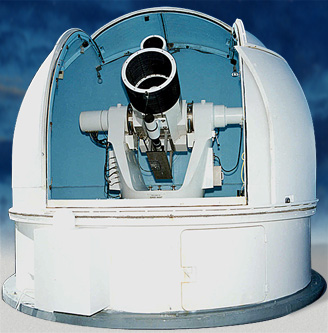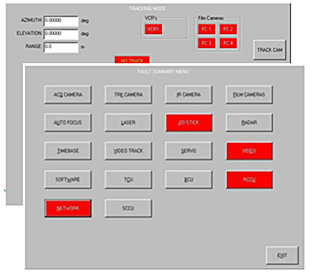The original RADOT Tracking Systems were developed by Photo-Sonics, Inc. for the United States Army Kwajalein Missile Range (USAKMR) approximately 10 to 15 years ago. The RADOTs in use are capable of collecting TSI component data to a very high degree of accuracy using a multiple-station solution technique.
 The basic design requirement for the Super Radot includes a base assembly
which contains the azimuth drive motor, tape cables, and the azimuth
carriage assembly. The elevation axis is comprised of the
elevation drive motors and the payload carrying platforms. A
separate control console is located adjacent to the mount. The
Super Radot provides smooth, vibration-free tracking within the range of
540 in azimuth and -10 to +95 in elevation. The
pedestal is enclosed in an Astrodome shelter. Electrical
and electronic facilities required to operate the mount are incorporated
into a local console within the Astrodome and a remote console located
in a control room which also houses a computer and Tracking Error
Detector System (TEDS) that automatically maintains target tracking once
a target is acquired. In addition to TEDS, the system also
operates in manual tracking mode, controlled by a stick controller
located in the control room and also in computer mode, which uses
pedestal position data and external target data to produce a tracking
error signal.
The basic design requirement for the Super Radot includes a base assembly
which contains the azimuth drive motor, tape cables, and the azimuth
carriage assembly. The elevation axis is comprised of the
elevation drive motors and the payload carrying platforms. A
separate control console is located adjacent to the mount. The
Super Radot provides smooth, vibration-free tracking within the range of
540 in azimuth and -10 to +95 in elevation. The
pedestal is enclosed in an Astrodome shelter. Electrical
and electronic facilities required to operate the mount are incorporated
into a local console within the Astrodome and a remote console located
in a control room which also houses a computer and Tracking Error
Detector System (TEDS) that automatically maintains target tracking once
a target is acquired. In addition to TEDS, the system also
operates in manual tracking mode, controlled by a stick controller
located in the control room and also in computer mode, which uses
pedestal position data and external target data to produce a tracking
error signal.
Control Software - The ARGUS control software
provides all the functionality the user would expect of
an advanced TSPI tracking system. It provides a
single interface for the tracking pedestal, sensors,
auto-tracking, radar, calibration, target simulation and
diagnostics of the complete tracking system. Control of
the system is simplified via an intuitive touch screen
GUI. The standard ARGUS application can control up to
10 sensor stations, in addition to radar and lasers,
allowing a single-operator complete control of all
aspects of a complex and highly capable system from
a remote location. It also provides the control of single
and dual-gate auto trackers and fixed focal length and
zoom lenses and focus tables. Automated Star
Calibration are incorporated to yield the highest TSPI
accuracy of any optical tracking system manufactured today.
Visit the ARGUS software page.
| Nominal Payload | 600 pounds |
| Maximum Payload | 1000+ pounds with reduced accuracy and performance |
| Standard Configuration | On-Axis optical payload with no man-on-the-mount |
| Optional Configuration | On Axis Optics with Off Axis Radar |
| Azimuth Torque | 1500 foot pounds |
| Elevation Torque | 2 x 300 foot pounds |
| Azimuth Acceleration | 100+ degrees/second2 with nominal payload |
| Elevation Acceleration | 100+ degrees/second2 with nominal payload |
| Azimuth Velocity | 100+ degrees/second |
| Elevation Velocity | 100+ degrees/second |
| Weight | 6500 lb trailer mounted pedestal with single axle |
| Dimensions | 125"L (plus 33" trailer tongue) x 87.25"W x 93.71"H |
| Calibration | No Radar: Turn & Dump, Star Calibration |
| Radar on Top | Star Calibration only |
| Radar On Side | Turn & Dump, Star Calibration |
| Encoder | 24 bit absolute position optical encoder with 23 bit quadrature output for velocity |

Photo-Sonics, Inc.
818-842-2141 (ph - switchboard paging)
818-842-2610 (fax)
mail@photosonics.com